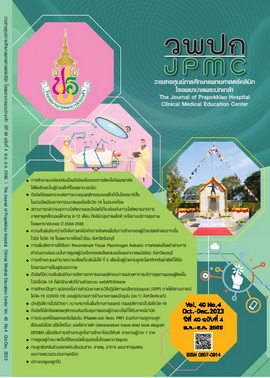Virologists: A Definition in the Medical Space before the Outbreak of COVID-19
Main Article Content
Abstract
BACKGROUND: During the Coronavirus disease 2019 (COVID-19) pandemic, virologists gained attention and importance in the medical and social space. The researchers were interested in the definition of virologists in the medical space before the COVID-19 virus outbreak by revealing the background of ideas, beliefs, and experiences that gave meaning to their profession.
OBJECTIVE: This research aimed to study the definition of virologists in the medical space before the COVID-19 outbreak.
METHODS: Critical autoethnography methods were used. The informants were virologists who worked within medical spaces in Thailand. The data were collected using in-depth interviews and participatory observations. The data were analyzed using grounded theory techniques and interpreted the experience by the researchers as an emic and the reliability of the data using trustworthiness.
RESULTS: The definition of virologists in the medical space before the COVID-19 outbreak through interpretation consisted of five meanings: 1. A proud professional virologist was defined as professional pride. 2. Undertook a thankless job: personnel who were not prioritized but indispensable. This definition revealed the classification of the profession. 3. A second-class profession of science learners. This reflected the hierarchical power in the medical field. 4. A long gown: A symbol of waiting, and encoded meaning to the profession through a uniform. 5. The dynamics of risk in the working life reflected the profession that constantly worked with risks.
CONCLUSIONS: The definition of virologists in the medical space before the COVID-19 outbreak showed that virologists were affected by the power and knowledge of the medical field. In turn, this led to the classification and formation of hierarchical power through professionalism and impacted the perception of the virologists. In this way, they became a docile body that submitted to the power of medical knowledge.
Article Details

This work is licensed under a Creative Commons Attribution-NonCommercial-NoDerivatives 4.0 International License.
References
Gerrard J. Tracing radical working-class education: praxis and historical representation. Hist Educ 2012;41:537-58.
Anggraeni R, Mahdiani S, Nazar IB. Knowledge, attitude, and behavior of Indonesian society towards Covid-19 pandemic. Sys Rev Pharm 2020;11:779-85.
VanDijk TA. Discourse and Knowledge : a sociocognitive approach. Cambridge: Cambridge University Press; 2014.
LeDoux J, Brown R, Pine D, Hofmann S. Know thyself: well-being and subjective experience. Cerebrum [Internet] 2018 [cited 2023 Jan 15];2018:cer-01-18. Available from: https://www-ncbi-nlm-nih-gov.cuml1.md.chula.ac.th/pmc/articles/PMC6353121/pdf/cer-01-18.pdf
Keenan EK. Using Foucault’s “disciplinary power” and “resistance” in cross-cultural psychotherapy. Clin Soc Work J 2001;29:211–27.
Charmaz K. Teaching theory construction with initial grounded theory tools: are flection on lessons and learning. Qual Health Res 2015;25:1610-22.
Stevens SM, Jago CP, Jasko K, Heyman GD. Trustworthiness and ideological similarity (but not ideology) promote empathy. Pers Soc Psychol Bull 2021;47:1452-65.
Foucault M. The history of sexuality, vol. 3: the care of the self. New York: Penguin Random House; 2020.
Hollin G. Constructing a social subject: autism and human sociality in the 1980s. Hist Human Sci 2014;27:98-115.
Kapranov O. Discursive representations of education for sustainable development in policy documents by English medium instruction schools in Estonia and Norway. Discourse and Communication for Sustainable Education 2021;12:55-66.
Chanthateero K, Jittsut D, Dechsri P, Boonmark P. Strategies for management of COVID 19 waste and linens for personal safety in a healthcare setting at Prapokklao hospital. J Prapokklao Hosp Clin Med Educat Center 2023;40:211-31
Belcher KH. “My body free to god”: pilgrimage as a technology of self in the book of Margery Kempe. Spiritus: A Journal of Christian Spirituality 2015;15:155-71.
Stehr N, Adolf MT. Knowledge/power/resistance. Society 2018;55:193-8.
Giladi P. A Foucauldian critique of scientific naturalism:“docile minds”. Critical Horizons 2020;21:264-86.
Genovesi MC. History and representation: a methodological approach from Castoriadis, Benjamin and Foucault’s thought towards the political field. Methaodos. Revitas de Ciancia’s Sociales 2017;5:318-30.
O’HaraMW. Foucault and film: critical theories and representations of mental illness [Dissertation]. Oxford: Miami University; 2014.

